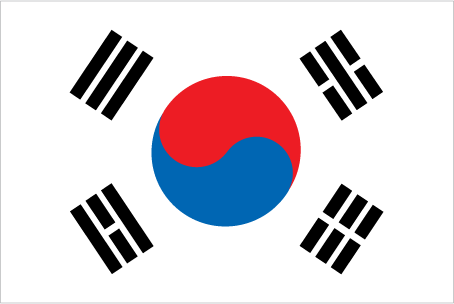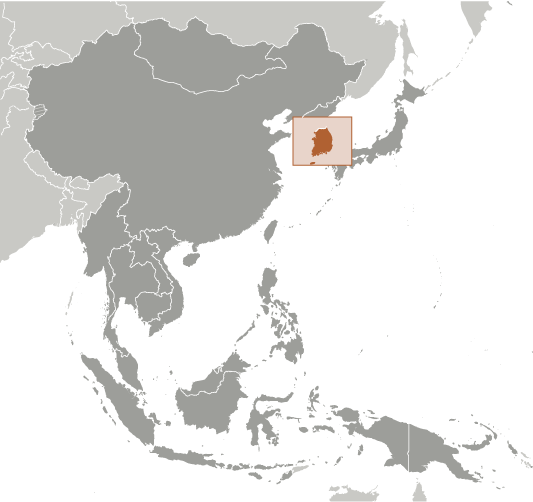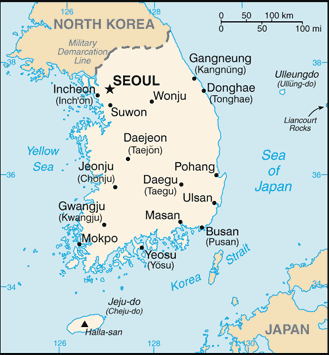|
Country name:
|

|
|
conventional long form: Republic of Korea
conventional short form:
South Korea
local long form:
Taehan-min'guk
local short form:
Han'guk
abbreviation:
ROK
|
|
|
Government type:
|

|
|
republic
|
|
|
Capital:
|

|
|
name: Seoul
geographic coordinates:
37 33 N, 126 59 E
time difference:
UTC+9 (14 hours ahead of Washington, DC during Standard Time)
|
|
|
Administrative divisions:
|

|
|
9 provinces (do, singular and plural), 6 metropolitan cities (gwangyoksi, singular and plural), 1 special city, and 1 special self-governing city
provinces:
Chungbuk (North Chungcheong), Chungnam (South Chungcheong), Gangwon, Gyeonggi, Gyeongbuk (North Gyeongsang), Gyeongnam (South Gyeongsang), Jeju, Jeonbuk (North Jeolla), Jeonnam (South Jeolla)
metropolitan cities:
Busan (Pusan), Daegu (Taegu), Daejon (Taejon), Gwangju (Kwangju), Incheon (Inch'on), Ulsan
special city:
Seoul
special self-governing city:
Sejong
|
|
|
Independence:
|

|
|
15 August 1945 (from Japan)
|
|
|
National holiday:
|

|
|
Liberation Day, 15 August (1945)
|
|
|
Constitution:
|

|
|
17 July 1948; note - amended or rewritten many times; current constitution approved 29 October 1987
|
|
|
Legal system:
|

|
|
mixed legal system combining European civil law, Anglo-American law, and Chinese classical thought
|
|
|
International law organization participation:
|

|
|
has not submitted an ICJ jurisdiction declaration; accepts ICCt jurisdiction
|
|
|
Suffrage:
|

|
|
19 years of age; universal
|
|
|
Executive branch:
|

|
|
chief of state: President PARK Geun-hye (since 25 February 2013)
head of government:
Prime Minister CHUNG Hong-won (since 26 February 2013)
cabinet:
State Council appointed by the president on the prime minister's recommendation
(For more information visit the World Leaders website  ) )
elections:
president elected by popular vote for a single five-year term; PARK Geun-hye elected on 19 December 2012; next election to be held in December 2017; prime minister appointed by president with consent of National Assembly
election results:
PARK Geun-Hye elected president on 19 December 2012; percent of vote - PARK Geun-Hye (NFP) 51.6%, MOON Jae-In (DUP) 48%, others 0.4%
|
|
|
Legislative branch:
|

|
|
unicameral National Assembly or Gukhoe (300 seats; 246 members elected in single-seat constituencies, 54 elected by proportional representation; members serve four-year terms)
elections:
last held on 11 April 2012 (next to be held in April 2016)
election results:
percent of vote by party - NA; seats by party - NFP 152, DUP 127, UPP 13, LFP 5, independents 3
|
|
|
Judicial branch:
|

|
|
Supreme Court (justices appointed by the president with consent of National Assembly); Constitutional Court (justices appointed by the president based partly on nominations by National Assembly and Chief Justice of the court)
|
|
|
Political parties and leaders:
|

|
|
Democratic United Party or DUP (formerly the Democratic Party or DP) [MOON Hee-sang (interim)]; Liberty Forward Party or LFP (now part of the NFP); New Frontier Party (NFP) or Saenuri (formerly Grand National Party) [HWANG Woo-yea]; Progressive Justice Party or PJP [ROH Hoe-chan and CHO Joon-ho]; United Progressive Party or UPP [LEE Jung-hee]
|
|
|
Political pressure groups and leaders:
|

|
|
Catholic Priests' Association for Justice; Citizen's Coalition for Economic Justice; Federation of Korean Industries; Federation of Korean Trade Unions; Korean Confederation of Trade Unions; Korean Veterans' Association; Lawyers for a Democratic Society; National Council of Churches; People's Solidarity for Participatory Democracy
|
|
|
International organization participation:
|

|
|
ADB, AfDB (nonregional member), APEC, ARF, ASEAN (dialogue partner), Australia Group, BIS, CD, CICA, CP, EAS, EBRD, FAO, FATF, G-20, IADB, IAEA, IBRD, ICAO, ICC (national committees), ICRM, IDA, IEA, IFAD, IFC, IFRCS, IHO, ILO, IMF, IMO, IMSO, Interpol, IOC, IOM, IPU, ISO, ITSO, ITU, ITUC (NGOs), LAIA (observer), MIGA, MINURSO, NEA, NSG, OAS (observer), OECD, OPCW, OSCE (partner), Paris Club (associate), PCA, PIF (partner), SAARC (observer), SICA (observer), UN, UNAMID, UNCTAD, UNESCO, UNHCR, UNIDO, UNIFIL, UNISFA, UNMIL, UNMISS, UNMOGIP, UNOCI, UNWTO, UPU, WCO, WHO, WIPO, WMO, WTO, ZC
|
|
|
Diplomatic representation in the US:
|

|
|
chief of mission: Ambassador CHOI Young-jin
chancery:
2450 Massachusetts Avenue NW, Washington, DC 20008
telephone:
[1] (202) 939-5600
FAX:
[1] (202) 797-0595
consulate(s) general:
Agana (Guam), Atlanta, Boston, Chicago, Honolulu, Houston, Los Angeles, New York, San Francisco, Seattle
consulate(s) general:
Anchorage (AK)
|
|
|
Diplomatic representation from the US:
|

|
|
chief of mission: Ambassador Sung Y. KIM
embassy:
188 Sejong-daero, Jongno-gu, Seoul 110-710
mailing address:
US Embassy Seoul, Unit 15550, APO AP 96205-5550
telephone:
[82] (2) 397-4200
FAX:
[82] (2) 725-0152
|
|
|
Flag description:
|

|
|
white with a red (top) and blue yin-yang symbol in the center; there is a different black trigram from the ancient I Ching (Book of Changes) in each corner of the white field; the Korean national flag is called Taegukki; white is a traditional Korean color and represents peace and purity; the blue section represents the negative cosmic forces of the yin, while the red symbolizes the opposite positive forces of the yang; each trigram (kwae) denotes one of the four universal elements, which together express the principle of movement and harmony
|
|
|
National symbol(s):
|

|
|
taegeuk (yin yang symbol)
|
|
|
National anthem:
|

|
|
name: "Aegukga" (Patriotic Song)
lyrics/music:
YUN Ch'i-Ho or AN Ch'ang-Ho/AHN Eaktay
note:
adopted 1948, well known by 1910; both North Korea and South Korea's anthems share the same name and have a vaguely similar melody but have different lyrics
|
|
|
|
|





 )
)



